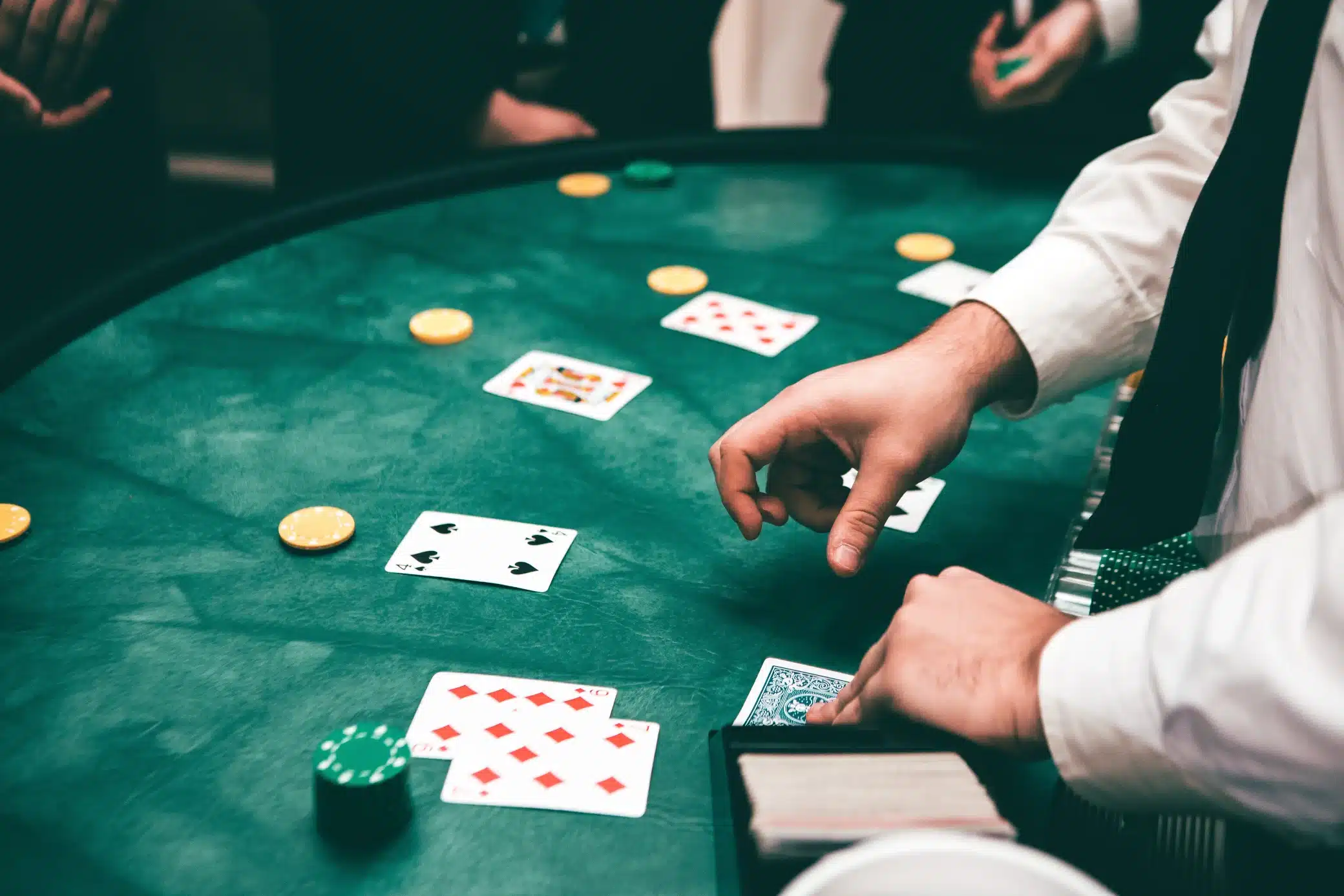Sports
When Playing Poker, You Need These 7 Social Skills

Table of Contents
Being sociable at the table is essential for success in poker, as the majority of successful players are aware. In fact, social skills were revealed to be one of the most crucial traits for winning the game in research by Robert J. Williams and Carrie A. Leonard. Before reaching this result, the researchers considered the players’ experience levels, various playing styles, and intelligence-related variables including emotional intelligence.
Some would argue that psychology matters more than the cards you’re dealt when playing poker, which has always been a key component of the game. For this reason, seasoned experts often say, “Play the players, not the cards.”
However, what does that truly imply if you’re new to poker? Poker success depends on having social intelligence, which includes the capacity to read people and comprehend how they behave in social contexts. The finest poker players are masters of this crucial talent, which frequently propels them to the pinnacle of their profession.
The following are the 7 social skills you must possess to play poker:
1) the Ability to Read People
The most crucial social skill for winning in poker is probably this one. Reading your opponents’ tells, body language, and betting habits may offer you a significant competitive advantage. The top players are always watching their rivals and searching for tells they may exploit.
2) Being able to control your own emotions
Being able to control your emotions is crucial in poker, as it is in life. Too much rage or excitement might impair judgment and cause you to make bad choices. Even in the face of difficulty, the top players maintain their composure.
3) The Ability to Bluff
The finest poker players are experts at this crucial aspect of the game. It may mean the difference between winning and losing a hand if you can sell a falsehood well. Bluffing calls for both self-assurance and social acumen; you must be able to read your opponents and predict when they’re about to fold. It is understandable why so many players find bluffing to be so enjoyable as it is one of the most exciting aspects of the game of poker.
4) the Ability to Read Tells
Any action that reveals details about a player’s hand is considered a tell. Experienced players have a strong edge in the game since they are adept at spotting tells. The finest players are always watching their opponents for tells they might exploit.
5) The Capability of Managing the Game’s Pace
The greatest players are adept at managing the game’s tempo. When they have a strong hand or are bluffing, they might make the action move more slowly. Although it might be challenging to perfect, this ability is crucial for success.
6) the Capacity for Swift Decision-Making
As in life, fast thinking may be an advantage while playing poker. The most effective players are capable of making choices without second-guessing them. This enables them to seize chances that others would pass over. However, you may utilize the “auto-muck” tool in online poker to make judgments swiftly.
7) Problem-solving Abilities
The social skill of problem-solving has to be handled differently in poker than it would in a typical social context. Players in poker constantly estimate statistics and odds while working to manage assumptions based on both facts and intuition.
When they’re on a losing run, many players find it difficult to seek for assistance from others. You must be able to address problems on your own if you cannot show your emotions openly.
In order to make the best choices possible, you must use the information at your disposal (known and unknown factors). Some people struggle tremendously with this because they lack social skills.
The wisest course of action while playing poker is to make choices that will safeguard your bankroll in the event that volatility turns against you. Some athletes do well in challenging social circumstances, while others crumble under pressure.
You’ll undoubtedly be put to the test at the poker table. Other skilled players could try to confuse you psychologically so that you doubt yourself and your decisions.
You can win in poker by having rapid problem-solving skills and accurate comprehension of the scenario. Players are routinely made fun of by other players in all kinds of competitive games.
For instance, in rugby, players may employ strong tackles or pushes to get in another player’s face, while sledding is a frequent type of verbal abuse in cricket. This kind of conduct exists regardless of whether it is more covert or overt in poker.
Sports
Keonhacai live Keonhacai.video Is Best for live sports streaming

Table of Contents
Keonhacai live Keonhacai.video, stands as a dynamic hub for live sports streaming, offering enthusiasts unparalleled access to a diverse array of sporting events. This introduction provides an overview of the platform’s immersive experience, exploring its wide range of sports coverage, user-friendly interface, and the convenience of real-time access to live sports action. Join us as we delve into the world of Keonhacai.live, where sports fans can unite to witness their favorite teams and athletes in thrilling live competitions, all from the comfort of their own screens.
The Diversity of Sports Offered on Keonhacai live Keonhacai.video
Keonhacai live Keonhacai.video boasts an extensive selection of sports, catering to a wide range of interests and preferences. From popular mainstream sports like basketball, football, and tennis to niche sports such as cricket, rugby, and MMA, the platform offers something for every sports enthusiast. Whether you’re a fan of international competitions, league matches, or local tournaments, Keonhacai.live ensures comprehensive coverage of various sporting events from around the globe. With its diverse lineup, Keonhacai.live stands as a go-to destination for sports fans seeking to immerse themselves in the excitement of live sports action.
Accessing Live Sports Events in Real-Time
Keonhacai.live provides users with the unique opportunity to access live sports events in real-time, delivering the thrill and excitement of the game directly to their screens. Through its intuitive interface and seamless streaming capabilities, the platform enables sports enthusiasts to stay connected to their favorite teams and athletes as events unfold. Whether it’s a crucial match in a major league or a thrilling tournament showdown, users can enjoy the action as it happens, ensuring an immersive and dynamic viewing experience. With Keonhacai.live, accessing live sports events in real-time has never been easier or more convenient.
Keonhacai live Keonhacai.video Quality of Streaming
The quality of streaming on Keonhacai live Keonhacai.video is paramount, ensuring users enjoy a seamless and immersive viewing experience. The platform employs advanced streaming technology to deliver high-definition video and audio, allowing users to witness live sports events with clarity and precision. With adaptive bitrate streaming, Keonhacai.live dynamically adjusts the video quality based on users’ internet connection speed, ensuring smooth playback and minimizing buffering.
User Experience and Interface on Keonhacai.video
Keonhacai.video prioritizes user experience by offering an intuitive and user-friendly interface designed to enhance the overall viewing experience. The platform’s interface is thoughtfully organized, allowing users to navigate seamlessly between different sports, events, and streaming options. With clear menus, easy-to-use search functions, and personalized preferences, Keonhacai.video ensures that users can quickly find and access their desired live sports content with ease.
Tips and Tricks for Maximizing Your Experience on Keonhacai live Keonhacai.video
To enhance your experience on Keonhacai live Keonhacai.video, consider implementing the following tips and tricks:
Optimize Your Internet Connection: Ensure a stable and high-speed internet connection to prevent buffering and interruptions during live sports streaming.
Explore the Platform: Take time to familiarize yourself with Keonhacai.live’s interface and features, such as search functions, personalized preferences, and interactive options.
Check Compatibility: Verify that your device and browser are compatible with Keonhacai.live to ensure smooth streaming performance.
Customize Your Settings: Adjust video quality settings according to your internet speed and preferences for an optimal viewing experience.
Utilize Interactive Features: Engage with live chat, social media integration, and other interactive features to connect with fellow sports enthusiasts and enhance your viewing experience.
Plan Ahead: Check the schedule of upcoming live sports events on Keonhacai.live and plan your viewing accordingly to ensure you don’t miss any exciting matchups.
Stay Informed: Stay updated on sports news, scores, and updates to enhance your understanding and enjoyment of live sports events.
Exploring Additional Features and Offerings on Keonhacai live Keonhacai.video
Beyond live sports streaming, Keonhacai live Keonhacai.video offers a range of additional features and offerings to enrich the user experience. These may include:
On-Demand Content: Access to a library of archived sports events, highlights, interviews, and analysis, allowing users to catch up on missed matches or relive memorable moments.
Multi-Device Compatibility: Seamless integration with various devices, including desktop computers, laptops, smartphones, tablets, and smart TVs, ensuring flexibility and convenience in accessing live sports content.
Personalized Recommendations: Curated recommendations based on user preferences, viewing history, and favorite teams or athletes, helping users discover new sports events and content tailored to their interests.
Interactive Viewing Experience: Engage with interactive features such as live chat, polls, and trivia games, fostering community engagement and enhancing the overall enjoyment of live sports streaming.
Statistical Insights: Access to real-time statistics, scores, and analytics during live sports events, providing in-depth insights into player performance, team strategies, and game dynamics.
Subscription Options: Flexible subscription plans offer ad-free viewing, exclusive content, and premium features for dedicated sports enthusiasts seeking an enhanced viewing experience.
Social Media Integration: Seamless integration with social media platforms, allows users to share their favorite moments, interact with fellow fans, and stay connected with the latest sports news and updates.
Conclusion
In conclusion, Keonhacai live Keonhacai.video stands as a premier destination for live sports streaming, offering users a comprehensive and immersive viewing experience. With its diverse selection of sports, user-friendly interface, and high-quality streaming capabilities, the platform caters to the needs and preferences of sports enthusiasts worldwide. By prioritizing the quality of streaming, embracing interactive features, and providing additional offerings such as on-demand content and personalized recommendations, Keonhacai.live elevates the live sports streaming experience to new heights. Whether it’s catching up on the latest matches, engaging with fellow fans, or accessing exclusive content, Keonhacai.live remains a go-to destination for sports fans seeking to stay connected to their favorite teams and athletes in real-time.
FAQs (Frequently Asked Questions) about Keonhacai live Keonhacai.video:
What sports are available for streaming on Keonhacai live Keonhacai.video?
Keonhacai live Keonhacai.video offers a diverse range of sports, including football, basketball, tennis, rugby, cricket, MMA, and more. Users can access live coverage of various international competitions, league matches, and tournaments.
Is Keonhacai live Keonhacai.video free to use, or do I need to subscribe?
Keonhacai live Keonhacai.video may offer both free and subscription-based options for accessing live sports content. While some events may be available for free streaming, premium features and exclusive content may require a subscription fee.
How can I access Keonhacai live Keonhacai.video on different devices?
Keonhacai live Keonhacai.video is compatible with a wide range of devices, including desktop computers, laptops, smartphones, tablets, and smart TVs. Users can access the platform through web browsers or dedicated mobile apps available for iOS and Android devices.
Can I watch archived sports events on Keonhacai live Keonhacai.video?
Yes, Keonhacai live Keonhacai.video may offer on-demand content, including archived sports events, highlights, interviews, and analysis. Users can catch up on missed matches or relive memorable moments at their convenience.
Is streaming on Keonhacai live Keonhacai.video legal and ethical?
Keonhacai live Keonhacai.video strives to operate within legal and ethical guidelines, obtaining proper licensing agreements and permissions for streaming live sports content. Users should also adhere to legal requirements and respect intellectual property rights when accessing content on the platform.
Sports
From Players to Fans: The Best Hockey Gifts for Everyone

Table of Contents
Hockey isn’t just a sport; it’s a passion that brings together players, fans, and communities. Whether for a die-hard fan or an aspiring player, finding the perfect hockey gifts can be as exciting as the game itself.
With the right gear, memorabilia, and fan accessories, you can bring the thrill of the ice into your home or enrich an athlete’s training routine. In this guide, we’ve handpicked must-have hockey items that will score points with anyone who lives and breathes the game.
Read on!
Customized Jersey
Nothing screams support like a customized jersey with your loved one’s name or favorite player’s number. A personalized jersey is a centerpiece among hockey gifts, allowing fans and players to feel a deeper connection to the game. It’s not merely apparel; it’s a badge of honor.
Jerseys come in various sizes, styles, and colors for men, women, and children. Whether it’s an NHL team jersey or a local club’s design, you can’t go wrong with this classic gift.
Moreover, you can also customize the jersey with additional features such as patches, stitching, and logos to make it truly one-of-a-kind. And with advancements in technology, you can even design a jersey online and have it delivered right to your doorstep.
Hockey Stick Bag
For the players, transporting their equipment is part of the ritual. A durable hockey stick bag makes the process easier and also protects the gear that helps them perform their best. With various styles and team logos available, stick bags mesh functionality with fandom.
This bag is a thoughtful present for athletes of all levels, from beginners to seasoned players. It’s an essential item that ensures their gear stays organized and accessible on the go.
Team Logo Apparel
From sweatshirts to hats, team logo apparel lets fans wear their pride for their favorite NHL team. It’s the kind of hockey merchandise that supports the spirit of the game whether you’re at the rink or simply running errands.
Logo apparel is a surefire way to make a fashion statement and show your loyalty to the team. Plus, with so many options available, you can find the perfect style for any fan. This gift is a win-win for both the recipient and their team.
Training Aids
If you want to help a player improve their skills, look no further than the latest training aids. These tools are designed to simulate on-ice scenarios, improving skills like shooting accuracy, stickhandling, and passing. They ensure that training can happen anywhere – no ice is required.
These aids are also great for players of all levels, from beginners to professionals. With the right training tools, they can take their game to the next level.
NHL Video Game
Bring the lightning-fast action of hockey into your living room with an NHL video game. It’s the perfect gift for those who want to experience the excitement of the NHL season all year round. Play with friends, and family, or dive into a solo career that takes you from rookie to pro.
Video games are a great way to bond with fellow fans or pass the time during the off-season. Plus, the graphics and gameplay make it feel like you’re right on the ice.
Hockey Puck Display Case
For the collector in your life, a hockey puck display case allows them to showcase their signed pucks or game-used memorabilia. It’s not just sports memorabilia; each puck tells a story of games watched, players admired, and memories made.
You can even find a hockey puck as a signed hockey memorabilia online. A puck signed by a favorite player or team not only adds value to the collection but also serves as a cherished keepsake.
Skate Blade Covers
Protect the blades that glide across the ice with high-quality skate blade covers. They are essential for any player, ensuring that their skates remain sharp and ready for action. Plus, they come in various designs, adding a personal touch to a player’s kit.
These covers are also a great gift for figure skaters or anyone who loves to skate. They keep blades safe during transport and protect them from scratches.
Tickets to a Game
Experience the electricity of a live game by gifting tickets to see an NHL match. The energy, the crowd, the competition – it’s an unforgettable gift for any hockey enthusiast. Watching professionals in action is not only thrilling but inspiring for players of all levels.
This is best given as a group gift, allowing friends or family to bond over their shared love for the game. It’s an experience that won’t soon be forgotten.
Training Equipment
Help your favorite hockey player train like the pros with professional-level training equipment. From plyometric platforms to resistance harnesses, the right equipment can elevate any athlete’s game and physical fitness to new heights.
This is such a good idea, especially for players looking to improve their strength and agility. With the right training equipment, they will be able to push themselves and see results on the ice.
Hockey-themed Home Decor
Transform a space into a hockey haven with team-inspired home decor. Think of team flags, bean bags, bedspreads, and even wall decals. This type of fan accessory brings the spirit of the game into your everyday life.
Moreover, it’s a great way to show off your team pride, especially when hosting game nights or gatherings. It also makes for a unique and thoughtful gift that will be appreciated by any hockey fan.
Shop For the Best Hockey Gifts for Everyone
The love for hockey transcends the rink, and so does the joy of receiving thoughtfully chosen hockey gifts. Whether you’re shopping for a player eager to improve their game or a fan who cherishes every goal, assist, and power play, these gifts are sure to delight and inspire.
Dive into the world of hockey merchandise, where every item is more than just a gift – it’s a piece of the passion that defines the sport.
Remember, gifting is not just the act of giving; it’s a way of connecting with the special hockey enthusiasts in your life.
Sports
Choosing the Perfect Online Casino

Table of Contents
In the digital era, there is a myriad of online casinos, and therefore, selecting the best platform towards an exciting gambling experience can be overwhelming. Uniqueness in features and games, including bonus offers, is what characterizes every online casino. In this write-up, three important factors that should influence your pick for the right online casino to match up with your tastes and offer a secure playing environment are what we will discuss here.
1. Licensing and Security:
The foundation of a trustworthy online casino lies in its licensing and security measures. Before diving into the world of digital gaming, it is essential to verify that the online casino holds a valid gaming license issued by a reputable regulatory authority. These licenses signify that the casino operates under stringent regulations, promoting fair play and player protection. Another important issue that should not be disregarded is security. An online casino ought to use powerful encryptors for example SSL (Secure Socket Layer) to shield your private records and money. Select platforms that take players’ security seriously, always checking customer feedback about casinos before making your choice.
2. Game Selection and Software Providers:
The perfect online casino for you should offer a diverse range of games that cater to your preferences. Whether you’re a fan of classic table games, immersive slots, or live dealer experiences, a well-rounded game library ensures that you’ll never run out of options.
Equally important is the reputation of the software providers that power the casino’s games. Renowned developers such as Microgaming, NetEnt, and Playtech are synonymous with quality, fairness, and innovative gameplay. Visit Official Website for the casino’s list of software providers and research their reputations to ensure that you’re engaging with games that are not only entertaining but also adhere to industry standards for randomness and fairness.
3. Promotions and Customer Support:
Promotional offerings can significantly enhance your online casino experience, providing additional value and excitement. Look for online casinos that provide enticing welcome bonuses for new players, as well as ongoing promotions, loyalty programs, and VIP schemes for regular patrons. However, it’s crucial to read the terms and conditions associated with these promotions to understand any wagering requirements or restrictions.
Customer support is another pivotal factor in evaluating the suitability of an online casino. Opt for platforms that offer responsive and comprehensive customer support services. This includes various communication channels such as live chat, email, and phone support, ensuring that assistance is readily available should you encounter any issues or have inquiries. The efficiency and friendliness of customer support can significantly impact your overall satisfaction with the online casino.
Choosing the perfect online casino for Muay Thai Online requires careful consideration of licensing and security, game selection, and the quality of promotions and customer support
if you focus on these most important considerations during a casino’s exploration, you can choose an appropriate platform for yourself among such a variety. Do not forget that only such online casinos as one providing a smooth combination of entertainment, security, and customer satisfaction can be called perfect.
-

 Travel4 years ago
Travel4 years agoThe Family of Kirk Passmore Issues a Statement Regarding the Missing Surfer
-

 Technology4 months ago
Technology4 months agoManyroon: The Key to Unlocking Future-Proof Business Solutions
-

 Cryptocurrency1 year ago
Cryptocurrency1 year agoBest Tips For Cryptopronetwork com Contact 2024
-

 Technology3 years ago
Technology3 years agoPaturnpiketollbyplate Login & Account Complete Guide Paturnpike.com
-

 Business4 months ago
Business4 months agoCoyyn.com Gig Economy: Smart Contracts and Fair Payments for Freelancers
-

 Apps & Software2 years ago
Apps & Software2 years agoFapello 2023: Social Media Platform for NSFW Content
-

 Law3 years ago
Law3 years agoShould I Hire a Lawyer For My Elmiron Case?
-

 Business4 months ago
Business4 months agoAcumen: The Key to Smart Decision-Making and Success






